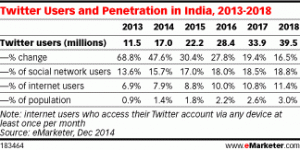ExchangeWire Asia-Pacific Weekly Round-Up

In this weekly segment, ExchangeWire sums up the key industry updates on ad tech from around the region – and in this week's edition: WeChat ads go live with major brands; Most Spotify users in AU happy to receive ads; Japan, India home to most Twitter users in APAC; Chinese regulator chides Alibaba for illegal online biz; BlisMedia appoints new Asia chief.
WeChat ads go live with major brands
Tencent Holdings has begun pushing ads on its mobile messaging app, WeChat, with a debut group of major advertisers that include BMW China, Coca-Cola, and local smartphone maker Vivo Communication Technology.
The ads started popping up over the weekend on the news feed of WeChat's content sharing platform, Moments, which can be accessed by 468 million active users a month. Users can choose to turn off specific ads by hitting a "Not Interested" button and how a user's friends interact with the ad--for example, with a Like or comment--will also be displayed.
WeChat users will view a new ad every two days and ads will stay active for a week if users interact with an ad, reported China Daily. Ads will automatically drop from the news feed if there is no interaction with the ad after six hours.
Tencent said in the report that it used a "rather intelligent technology" to push ads to targeted audience segments, suggesting that WeChat users would receive different ads from their friends.
This apparently became the subject of much mockery among the mobile chat users in China, who took to comparing their wealth status based on the type of ads they received. Those who were pushed BMW ads were ecstatic as it likely meant they were deemed to be able to afford one, while those who got Coca-Cola ads were less enthusiastic since most people would be able to buy a can of the soda.
BMW told China Daily that its WeChat ad was performing well, clocking 7 million comments or Likes within 17 hours after it made its debut. Its public account on WeChat also saw 200,000 new fans the day after.
Most Spotify users in Australia happy to receive ads
Brands in Australia will be happy to hear that 9 out of 10 Spotify users are willing to receive advertisements in exchange for the free music service.
According to study by YouGov, 94 percent of respondents said this was a fair tradeoff to curb piracy and generate revenue for artists. The research also revealed that these users spent on average 145 minutes a day on Spotify, nine times longer than they did on Facebook.
Some 78 percent of Spotify users in Australia are under 34 years of age, and the music service's user base on average generate higher incomes than the overall population.
Spotify's managing director for Australia and New Zealand, Kate vale, said: "Our audience understands that listening to a campaign message in return for unbeatable free content, so that artists can get paid, is a great exchange."
Songstress Taylor Swift last year pulled her songs from the streaming service because she felt artists were not sufficiently paid for their work. Spotify, however, said almost 70 percent of its revenue from paying customers--including those who paid US$9.99 a month for its premium service--went paid out to rights holders in royalty fees.
Japan, India home to most Twitter users in APAC
Japan and India will be home to two of Asia-Pacific's largest Twitter populations this year at 26 million and 22.2 million users, respectively.
Japanese social media users access the microblogging service at least one a month, or 25.1 percent of the country's online community, according to the latest stats from eMarketer. Growth in Twitter adoption will begin to slow in Japan, dropping to 2.9 percent by 2018 from a double-digit climb this year.
Growth in India is at 30.4 percent this year and will continue to increase by 16.5 percent in 2018. Even at 22.2 million, however, the Twitter community accounts for just 8.8 percent of the country's online population.
Indonesia is Twitter's third-largest user base in the region, with a projected 18.7 million monthly users this year.
Chinese regulator chides Alibaba for illegal online business
In a rare public outburst against one of the country's golden geese, China's State Administration for Industry and Commerce (SAIC) released a report chiding Alibaba Group for failing to eradicate the sale of illegal goods.
The Chinese regulator said many goods sold on Alibaba's e-commerce sites, which include Taobao and Tmall, had violated intellectual property rights or were banned from commercial sale. These included fake cigarettes, alcohol, branded goods, and weapons. s
The report contained a summary of discussions between government regulators and Alibaba held in July 2014, but its release was delayed to avoid impacting the Chinese company's September IPO in the US.
Alibaba had long ignored the illegal business activities and failed to take effective measures to eliminate the problem, allowing what was a small issue to fester into a major life problem, the commerce administration said, referring to a Chinese proverb.
On its part, Alibaba pledged to address the problem but said it would file a complaint with SAIC over improper inspection methods.
BlisMedia appoints new Asia chief
Ad tech and big data vendor, BlisMedia, has hired a new managing director for its Asian operations. Regina Goh will focus on expanding the company's operations into more Asian markets this year and further bolster its growth across Southeast Asia.
Before her new appointment, Goh headed Millennial Media's Asia-Pacific sales team and held senior management roles in global digital and advertising companies. She is also the current chair of the IAB's mobile committee in Singapore, where she aims to drive initiatives in mobile advertising.








Follow ExchangeWire